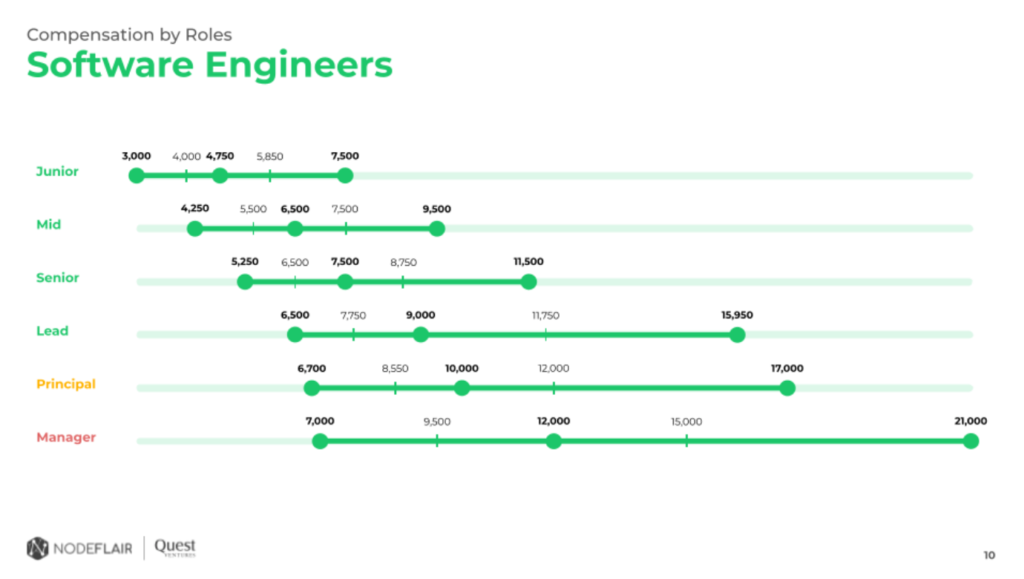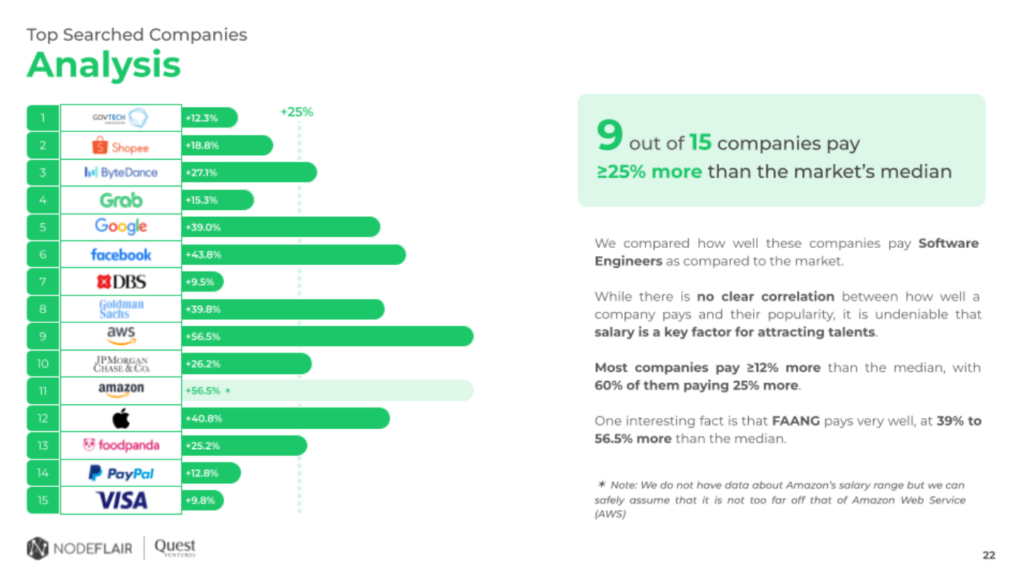- The salaries of software engineers reached an all-time high after increasing by up to 32 per cent.
- The 90th percentile of software engineers is paid as much as 3x more than those in the 10th percentile.
- 9 of the 15 most searched companies pay 25 per cent above the market median.
- Companies should allocate resources to growing and retaining talents besides recruitment.
The Tech Talent Compensation report, published by tech talent platform NodeFlair and Asia’s top venture capital firm, Quest Ventures, highlights that the tech talent war continues to intensify in Singapore as companies compete with each other with jaw-dropping salary offers.
The report uncovers the tech talent salary black box and empowers tech talents and employers by analysing more than 30,000 data points from NodeFlair’s proprietary database and in-depth interviews with founders and engineering leaders.
“Recognising the gravity of the global tech talent squeeze and its impact on Singapore and Asia, the team went on a mission to diagnose the pain points for tech talent and hiring entities,” says James Tan, Managing Partner at Quest Ventures.
“Salary is identified as the largest push and pull factor, and the reason responsible for failed job placement.”
Tech salary is at an all-time high

In the last twelve months, the average salaries for software engineers reached an all-time high after increasing by up to 32 per cent.
For example, the median base salary compensation for a junior software engineer is SG$4,750 (US$3,532.45).
Mid-level and senior software engineers, it increases to SG$6,500 (US$4,833.88) and SG$7,500 (US$ 5,577.22) respectively; and at a lead level, it reaches SG$9,000 (US$6,692.67).
Meanwhile, at the 90th percentile, the median base salary can be as much as 3x more than those in the 10th percentile.
For instance, junior software engineers at the 90th percentile have gone up to SG$7,500 (US$5,577.22). Mid-level and senior software engineers can command SG$9,500 (US$7,064.48) and SG$11,500 (US$8,553.12), respectively; it is not surprising that lead software engineers can cost an eye-popping base salary of SG$15,950 (US$11,861.70).
Also Read: How I went from an Android developer to CTO of a Vietnamese e-commerce
“We try to stay competitive to attract tech talents, and we do it through two components: cash and equity,” says Ashish Awasthi, CTO of Series C startup Homage and previously held the role of Vice President at Lazada and Redmart. “We understand that employees should feel valued and compensated for their skills and contributions.”
The rise of tech salary is not slowing down anytime soon
Amongst the reasons why talents are looking for new opportunities, it is not surprising that a better salary package is the top reason (65 per cent).
“Salary ranks higher than other reasons like their desire to work on new technologies, work-life balance and growth opportunities.,” says Ethan Ang, CEO and Co-Founder of NodeFlair.
“While companies can, and will, work on the non-compensation aspect to attract talents, the easier way out in the short term will be to increase their hiring budget, especially when they are on a hiring spree.”
Furthermore, in 2021, investors poured US$30 billion into blockchain and cryptocurrency because of the growth and demand for Web3 technologies.
Due to the shortage of blockchain engineers, companies have adjusted their hiring strategy by hiring software engineers interested in picking up blockchain development instead, further intensifying the competition for these tech talents.
“I am interested in your company, but…”
If talents are not interested or applying to your company despite your company’s recruitment effort, you are probably not alone.
The report noted that the top 15 most searched companies include the likes of homegrown tech firms like Shopee and Grab, as well as foreign tech giants Bytedance and FAANG (Facebook, Amazon, Apple and Google).
These companies have two things in common– they pay well above the market median and have above average Glassdoor ratings.
Also Read: From sommelier to AVP of Customer Success at a tech unicorn: Lessons from my career journey
Most of these companies pay more than 12 per cent above the market median; 9 of the 15 pay 25 per cent above the market median.
In addition, 14 out of the 15 companies have Glassdoor ratings above the median of 3.8; and 5 of them have ratings that are at least 75th percentile of 4.2.

There is more to talent management than just recruitment
As the talent war over engineers intensifies, companies should be prepared to face shorter average tenures and higher turnover rates amongst employees.
Talent churn in engineering functions is more than a one-off recruitment cost to replace the lost headcounts – it is much more expensive as the company has to replace those who left and onboard new members into the team.
The report remarks that while many companies allocate most of their resources on recruiting talents, few have invested equivalent effort resources into talent development and retention.
NodeFlair CEO Ethan Ang shared that at a turning point, the tangible and intangible costs of recruiting talent can be too high for a company if it does not have a strong culture in place to retain these talents.
Quoting Gibson Tang, Lenskart SEA Engineering Lead, from the report on how companies can retain top talents, “Having learning opportunities and being able to work with great developers are what I would consider as factors. The immediate environment that tech talent is in plays a big part in whether they will stay or leave.”
“Companies need to invest in leaders who can grow and retain these talents through non-compensation means, such as enforcing a higher quality engineering culture and creating a better developer experience,” Ang added.
This article was first published on February 23, 2022.
–
Editor’s note: e27 aims to foster thought leadership by publishing views from the community. Share your opinion by submitting an article, video, podcast, or infographic
Join our
